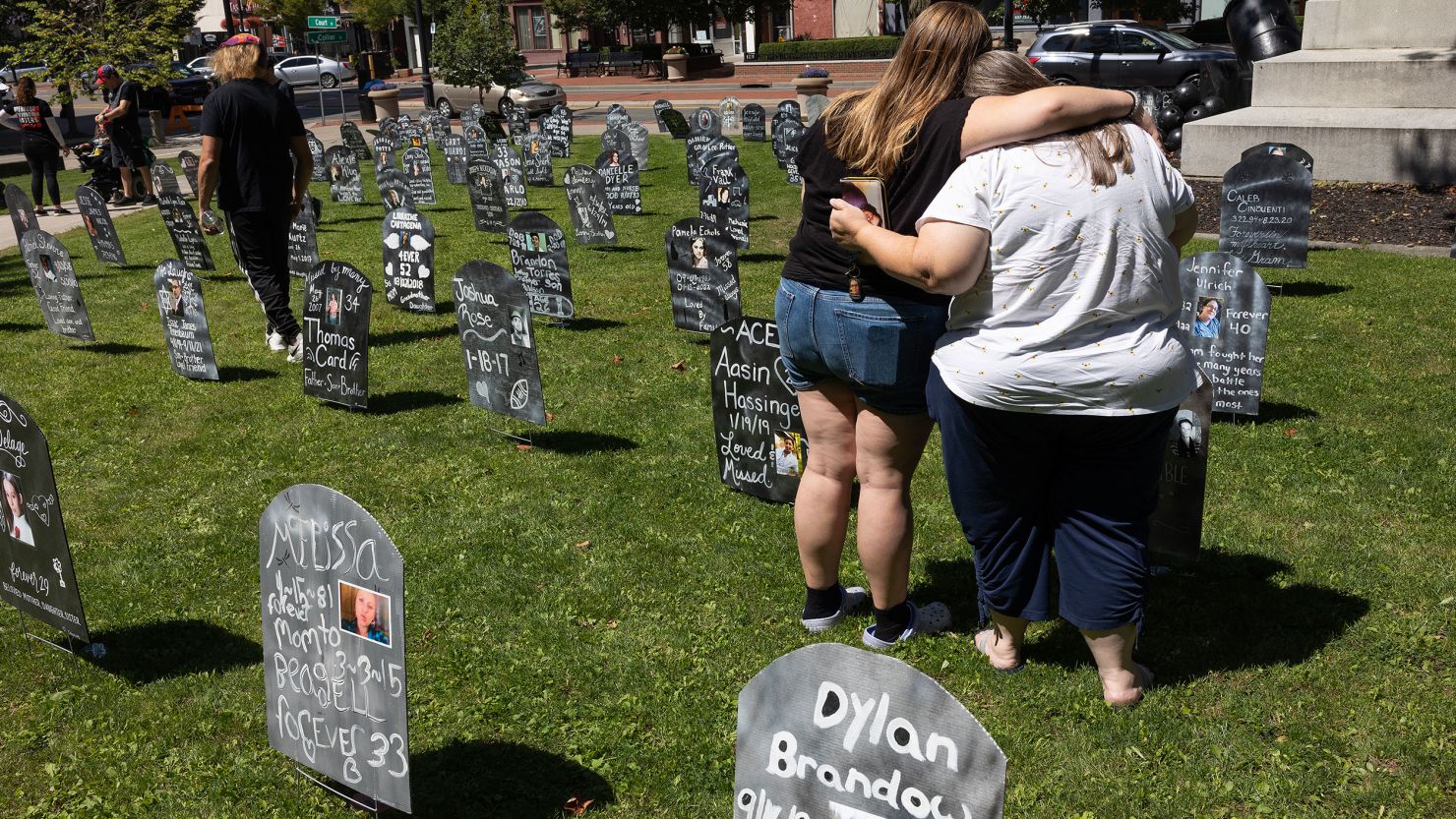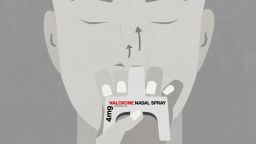Emergency physician Dr. Gail D’Onofrio has seen the grief and heartache firsthand, she said. Each time, the same questions are asked through tears: What else could I have done?
A mother who has lost her child to a drug overdose might ask, “Why didn’t I see the signs?” Or a friend might question, “Could I have intervened in some way?”
Almost half – about 42% – of adults in the United States say they personally know at least one person who died from a drug overdose, according to survey findings published Wednesday by the nonprofit research institute RAND Corporation.
The report found that among adults who reported knowing someone who died by overdose, the average number of lives lost whom they knew was two – which illustrates the “far-reaching consequences” of the nation’s overdose crisis.
Just a few weeks ago in Connecticut, loved ones were affected when someone using cocaine laced with fentanyl died of an overdose, said D’Onofrio, who is also a professor at Yale School of Medicine and an addiction specialist at Yale New Haven Hospital. She was not involved in the new RAND report.
“Lately, there’s been so many overdose deaths that were inadvertent. People were using another drug like cocaine, which is adulterated with fentanyl. Or they’ve taken a pill from someone that they thought was an oxycodone, and instead, it was fentanyl,” D’Onofrio said. Fentanyl is a powerful synthetic opioid that can be deadly even in small amounts. It is about 100 times more potent than morphine and 50 times more potent than heroin as an analgesic.
“We’ve seen this rapid rise in deaths,” D’Onofrio said. “And I think that those left behind question themselves and are always wondering, like, ‘What could I have done to have prevented this or have intervened in some other fashion?’ That’s really difficult.”
The RAND report mentions that losing someone to overdose may be associated with developing long-term grief, substance use disorders and even suicidal ideation.
“This really highlights what many of us experience in the day-to-day in an emergency department – that one tragedy can often lead to many other tragedies,” D’Onofrio said. She applauded the new RAND survey for shedding light on what adults go through when they lose someone to overdose.
“It really is a ripple effect,” she said. “And we don’t often think of this, even though many of us have experienced this as emergency physicians.”
‘Loss, grief, and trauma related to overdose’
The new survey findings reflect how every person who dies by overdose leaves behind people who are grieving, said Alison Athey, lead author of the RAND report.
“I wasn’t that surprised at all because of the scope of the overdose crisis, and because of what we know about other types of traumatic deaths,” said Athey, an associate behavioral and social scientist at RAND and licensed clinical psychologist.
Athey and her colleagues at RAND surveyed more than 2,000 adults in February and March 2023 on how many people throughout their lives they knew personally who died by overdose. About 58% of survey respondents said zero, 19% said one person, and another 19% said about two to five people. Around 4% said at least six people.
Kerry Nolte, a nurse practitioner who was not involved in the RAND survey, said she would put herself in the category of losing at least six people to overdose whom she knew personally.
“It is upending, and grief from these losses continues to affect me, but it motivates me to continue to do the work of supporting people who use drugs and those that experience trauma,” Nolte, associate professor of nursing at the University of New Hampshire, said in an email.
In rural New England, Nolte and her collaborators have interviewed people who have witnessed overdoses. During their research, one person shared, “I’ve been to more of my friends’ funerals than I’ve been to my friends’ weddings.” That became the title of one of their research papers.
“I have heard innumerable traumatic stories of loss, grief, and trauma related to overdose,” Nolte said, adding that providing people with access to naloxone, known by the brand name Narcan, can help save lives. It’s a medication that can rapidly reverse an opioid overdose.
“It is critically important to equip those most likely to witness an overdose with naloxone and basic training in overdose response,” she said. “But I fear that with the current drug supply that has a laundry list of additives and variable potency, we will continue to see an increase in those who lose loved ones to overdose and the associated trauma of these losses. It is really important we acknowledge the impact on our communities and continue to advance strategies that reduce overdose.”
Among the adults in the RAND survey who have lost someone to overdose, only about 10% said the death had little effect on their life. The remaining adults said the deaths did affect them in some way.
The survey also found that being exposed to an overdose death was more common among women than men, married adults than single adults, people born in the US than immigrants and people living in urban settings than those in rural settings.
Rates of exposure also varied regionally, with more people knowing someone who died by overdose in New England and the East South Central area of the country, including states such as Alabama, Kentucky, Mississippi, and Tennessee, according to the survey. Athey said that the regional differences are probably because those are the regions that have been hit the hardest by the opioid epidemic.
“Those are some of the regions where we see the highest number of overdose deaths. So I think it’s a product of higher numbers of deaths in those regions, so that we see more bereavement,” she said.
Also “in New England, there are more urban environments and it may be that those more densely populated areas result in more exposures to these types of deaths. But that’s speculation,” she said. “We really know very, very little about this experience of overdose loss and how it impacts individuals and how it impacts communities.”
‘This is an underserved discussion’
Often, the family members and loved ones of people with substance use disorder do not even know about that person’s current drug use, said Dr. Kurt Kleinschmidt, professor of emergency medicine in the Division of Medical Toxicology at the University of Texas Southwestern Medical Center.
Kleinschmidt, who treats people with addiction, said that many of his patients have attempted to hide their substance use from those they are the closest to, such as a parent or a spouse. Because of this, an overdose death can sometimes be a devastating shock to family and friends.
“It’s really hard to hide the disease of addiction, but it’s tried all the time, that they’re trying to hide it,” said Kleinschmidt, who was not involved in the RAND survey.
After an overdose death, loved ones often feel continuous guilt and think they could have done more to help. This impact is not talked about enough, according to Kleinschmidt.
“The vast majority of families continue to feel sadness and guilt. Guilt is a giant, massive piece because everyone thinks, ‘What if I had only pushed them harder to get care?’ or ‘What if I only visited them more often?’” Kleinschmidt said, adding that he plans to share the RAND paper with his colleagues in the field of addiction medicine.
“For those of us who practice addiction medicine, this is an area that we don’t discuss as much as we should,” he said. “I think this is an underserved discussion.”
Robin Pollini, a professor at West Virginia University and expert on overdose data, said she commends the RAND researchers for examining this issue.
“The number of deaths caused by overdoses is frequently cited but there is seldom, if ever, discussion of the collective trauma we are experiencing as a result of these deaths. All of these people – more than 100,000 a year – had people who loved them and cared about them and grieve their loss,” Pollini, who was not involved in the new research, said in an email.
More than 111,000 people in the US died from a drug overdose in the 12-month period that ended in September, according to provisional data from the US Centers for Disease Control and Prevention’s National Center for Health Statistics.
The number of overdose deaths associated with any drug continues to increase each month in the United States, although the pace appears to be slowing. Deaths reached a record high in May and changed little in the following months, through September.
“I appreciate that the researchers paid special attention to the effects that witnessing someone’s overdose and/or losing someone to overdose can have on people who use drugs. This is also rarely discussed in scientific and policy circles,” Pollini said of the RAND survey.
A limitation of the study is that it surveyed only adults and did not include children’s perspectives, she said.
“Because the data come from a survey of adults, the study does not provide insight into how overdose deaths impact children. People lost to overdose are parents, grandparents, siblings … this is part of the story that remains largely untold,” Pollini said in the email.
Get CNN Health's weekly newsletter
Sign up here to get The Results Are In with Dr. Sanjay Gupta every Tuesday from the CNN Health team.
Children were not included in the report since the survey involved a panel of adults that was already involved in other research at RAND, Athey said, but she agrees that examining the impact overdose deaths have on children is important, as some separate research at RAND suggests that there are higher rates of child suicide in communities in which there are high rates of overdose deaths.
Overall, “I appreciate how thoughtful the authors are in articulating what we don’t know about ‘overdose loss.’ That said, these deaths are preventable,” Pollini said. “We need to constantly emphasize that all of this could be prevented if we had the policy environment and resources necessary to broadly implement the many evidence-based interventions that we know reduce fatal overdose risk.”





